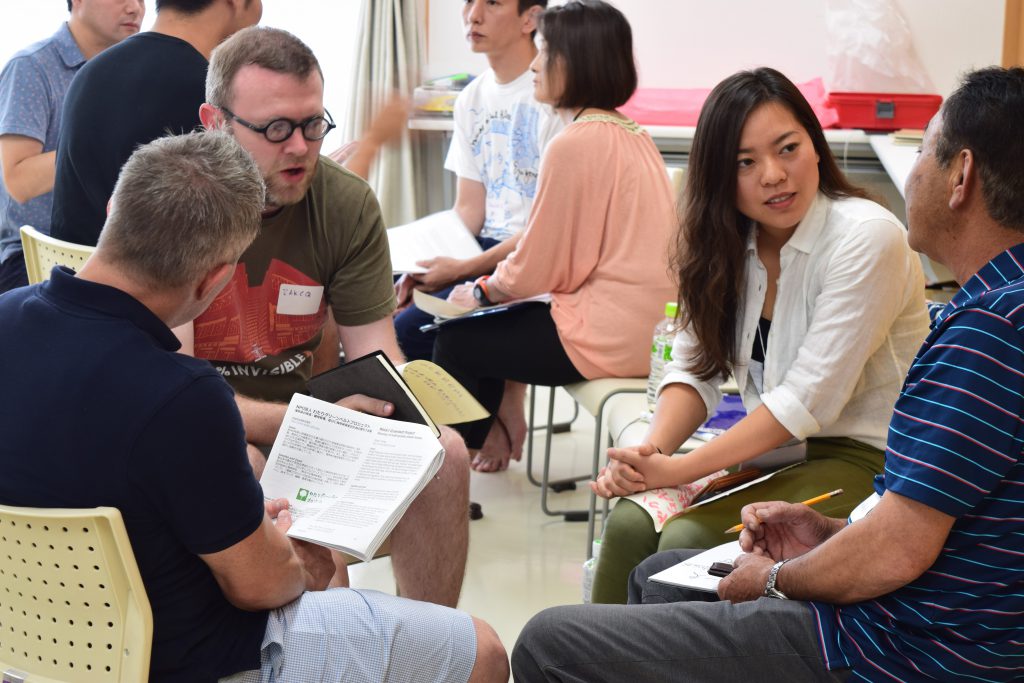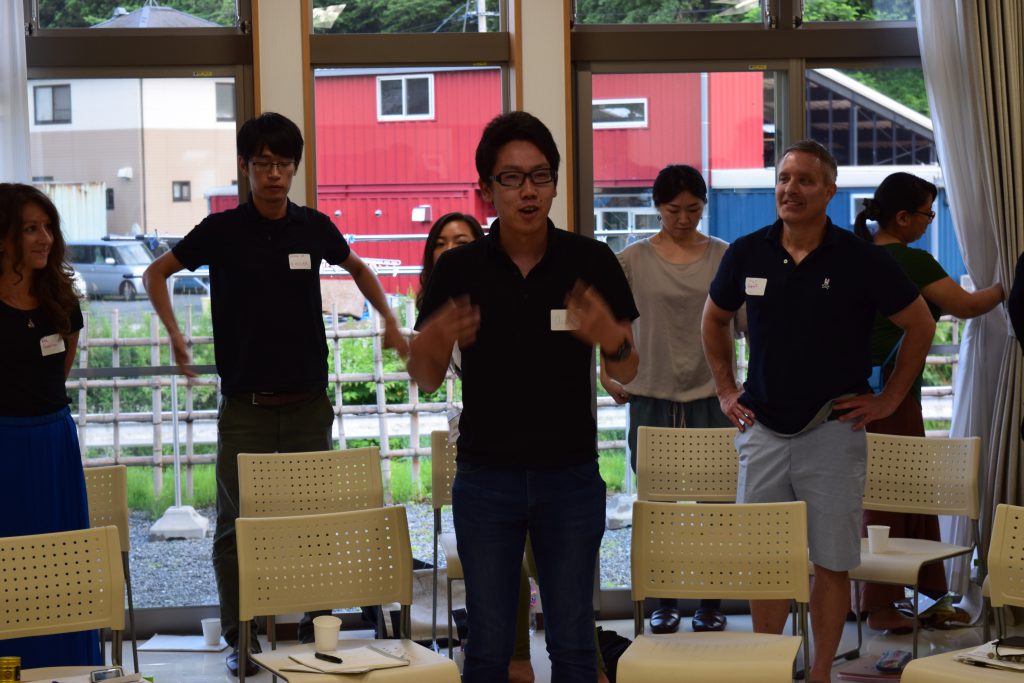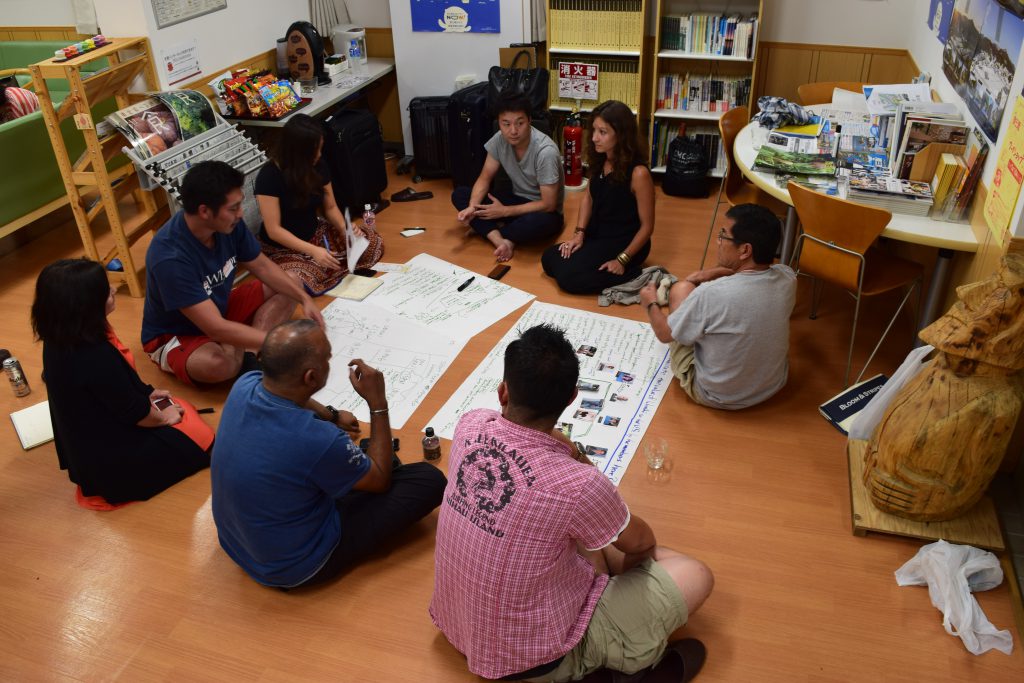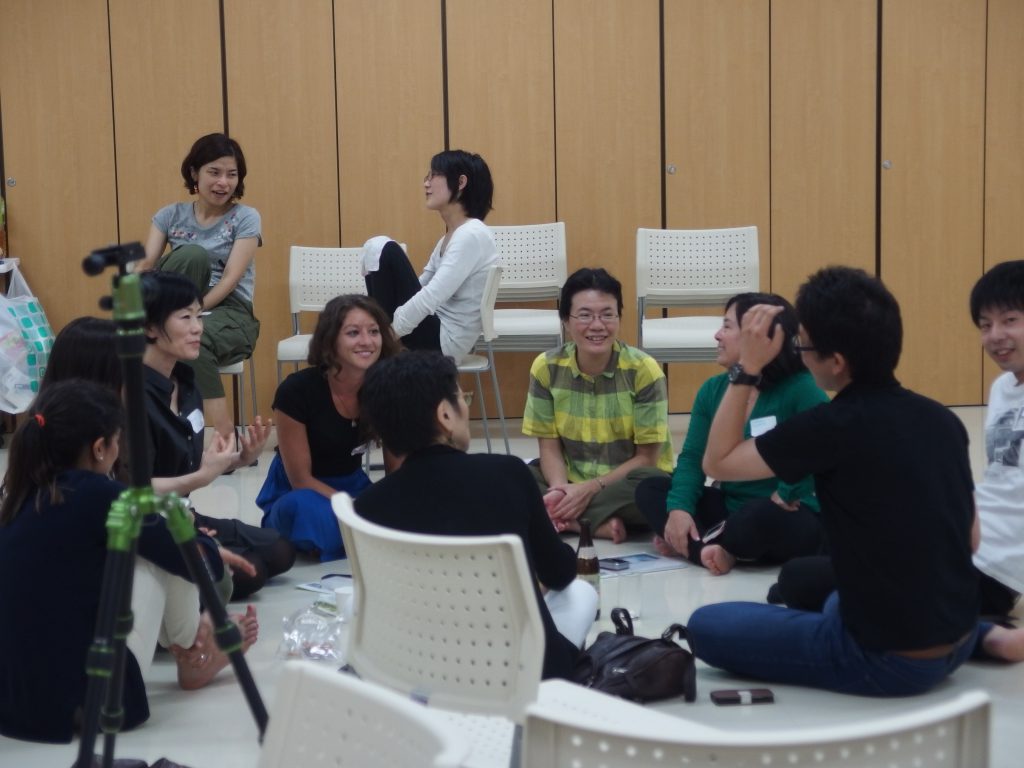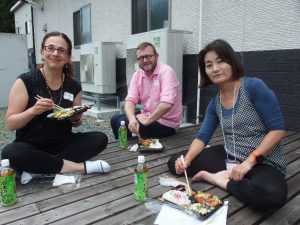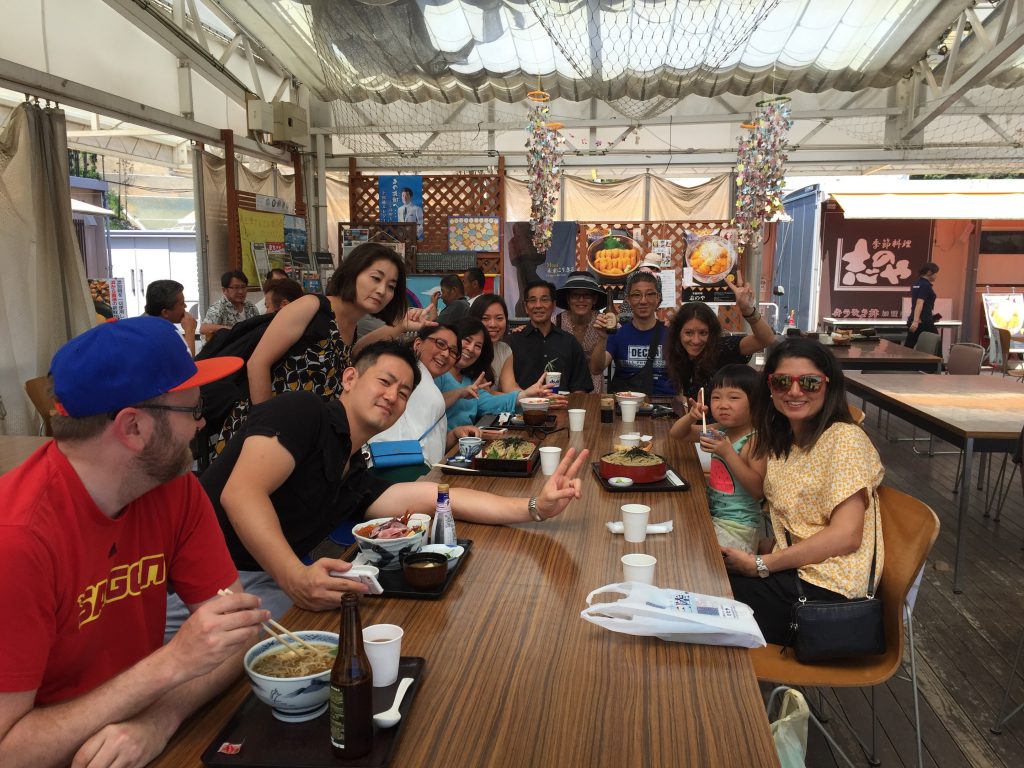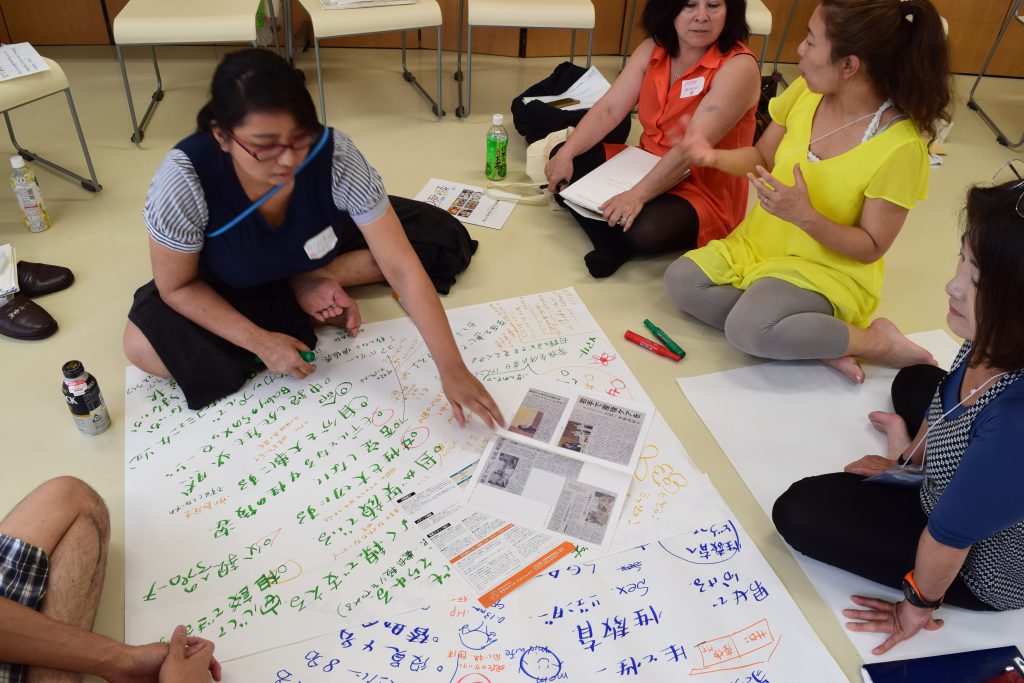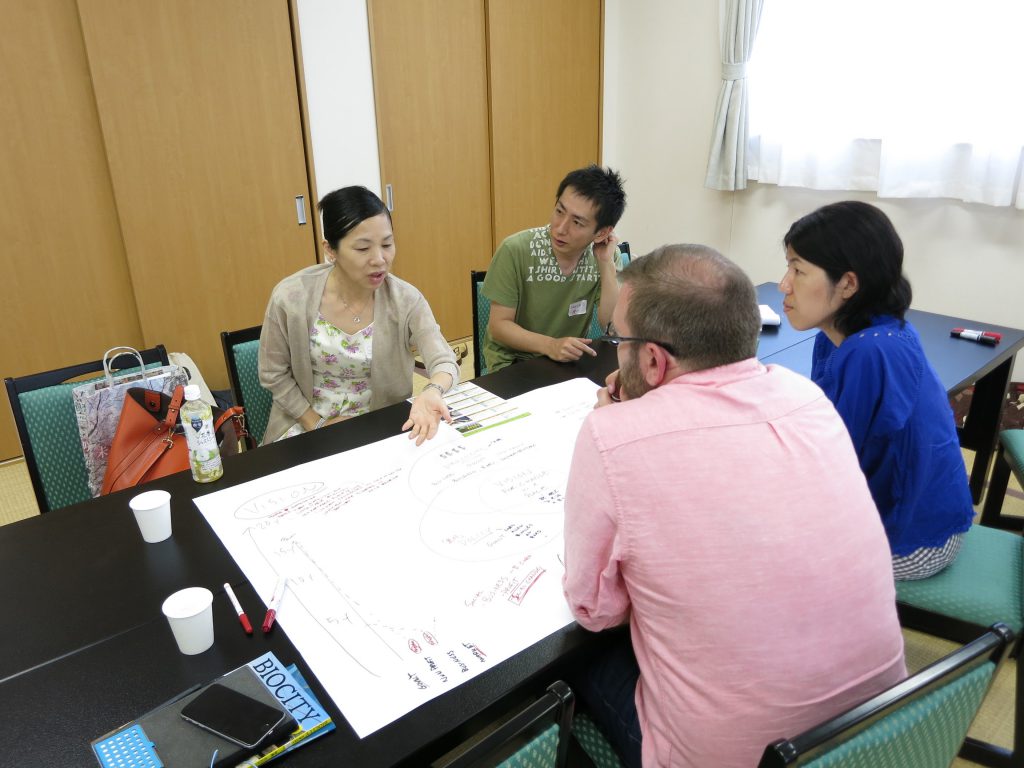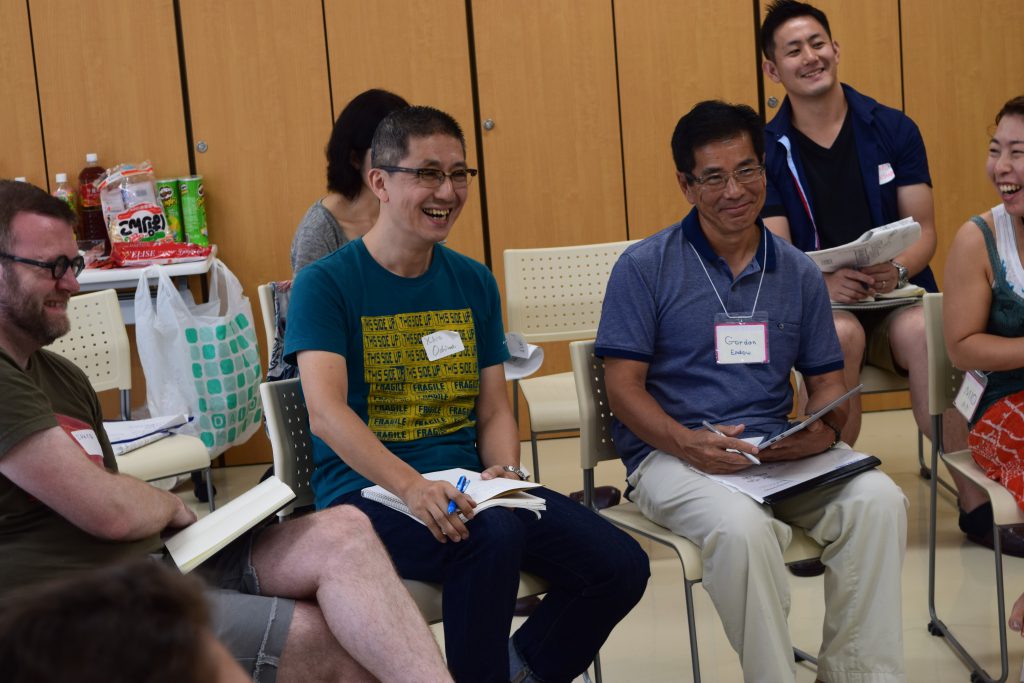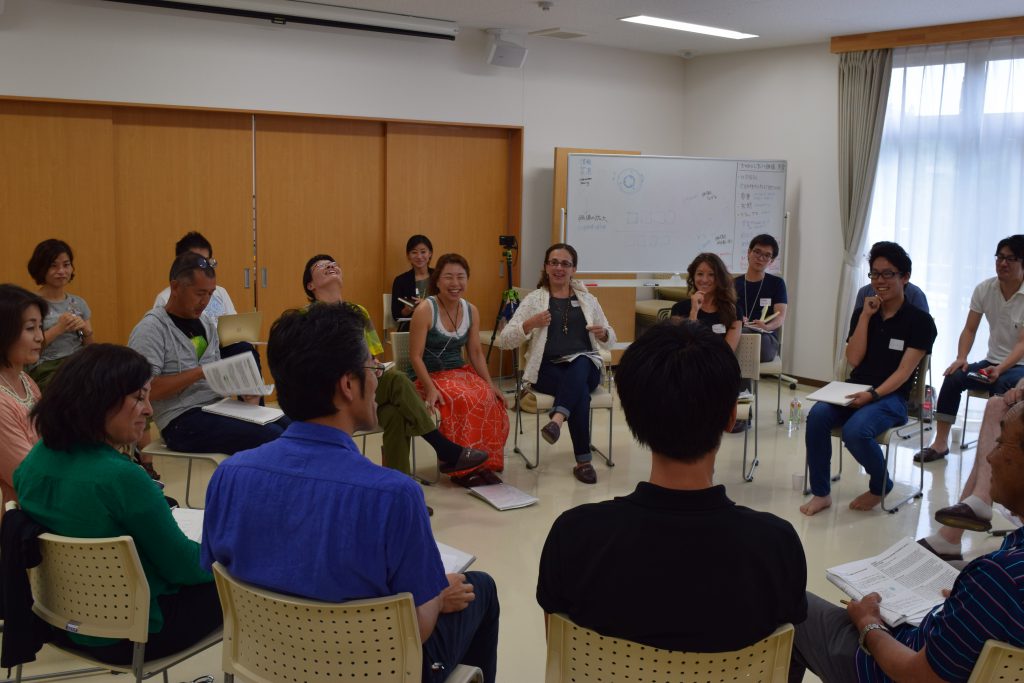The latter half of the Cross-Border Learning Journey was a three-day immersion into group discussions and dialogue to seek practical collaborations among the US-Japan participants and nine social ventures.
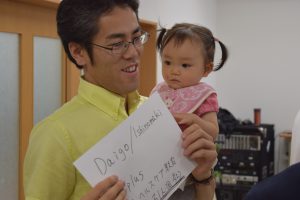
Daigo Hashimoto, CEO of Replus, introducing himself with his daughter in his arms. (Photo by Shinya Sotowa)
Day 1 of the workshop started with sharing findings about each organization during the field visits. Then we brainstormed and discussed new ideas, resources, and connections to grow the social ventures. Many of the ideas that came from the US-Japan participants were very new to the social entrepreneurs, which served as opportunities to further deepen understanding about each other, as well as about how the social sector operates in both nations.
Conversations continued during the free time after dinner until midnight. For example, Ryota, a participant from Chicago and a young entrepreneur who raised more than $300K on KickStarter, gave advice on best practices for crowdfunding to GIFTHOPE, one of the social entrepreneurs that participated.
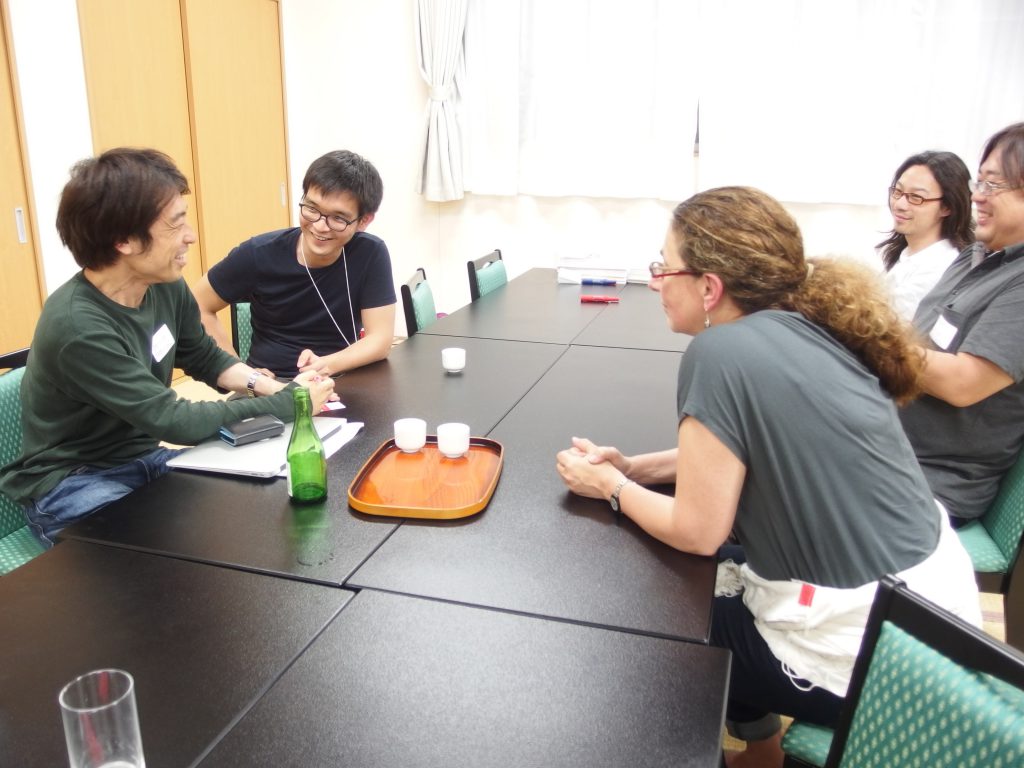
During Day 2, we dedicated an extended amount of time for checking in with one another. Each person shared his/her appreciation and concerns or something to be further explored, if any. We found that sharing these genuine feelings and acknowledging one’s own inner thoughts is such a critical process in establishing collaborations, especially with a group of forty people coming from different backgrounds. We also included time for playful exercises and relaxing lunch time in the sun.
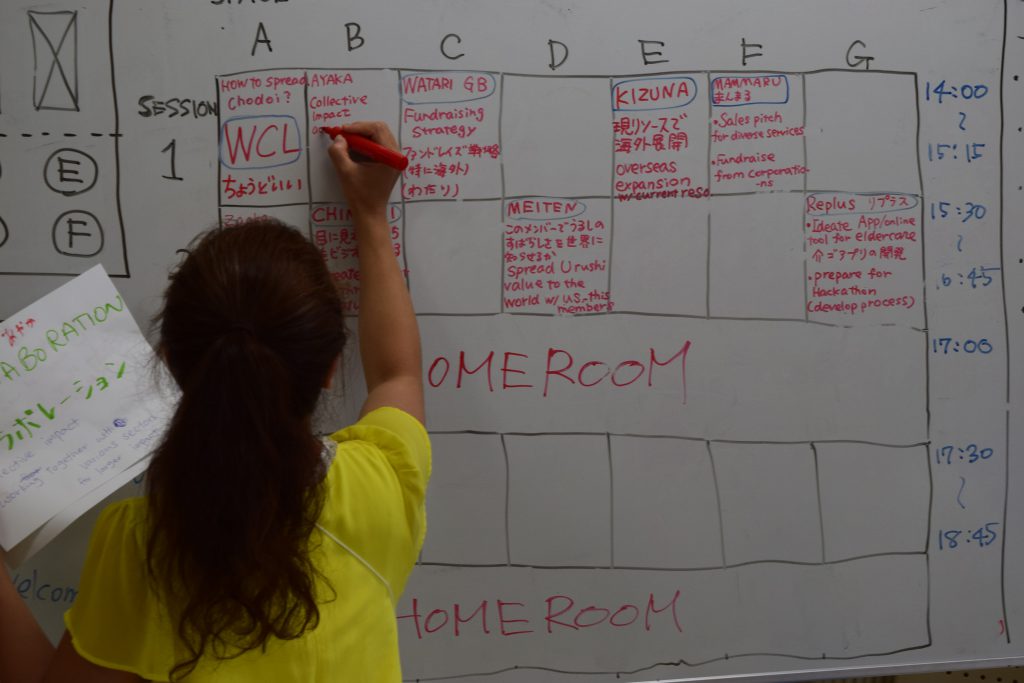
Topics proposed by social entrepreneurs and participants were written up on the white board (Photo by Shinya Sotowa)

This group discussed the long-term coastal forest restoration plan for Watari Green Belt (Photo by Shinya Sotowa)
Many participants were so eager to keep discussing with social entrepreneurs even late into the night (of course, over drinks). Meiten, a participating social venture, drafted a concrete plan with various role assignments for its expansion into the US market.
On the last day of the retreat, participants exchanged messages, which included a range of advice and commitments that they would make for each other moving forward. We enjoyed local cuisine at Minamisanriku Sun Sun Shopping Village for lunch, followed by a moving and emotional study-tour of disaster-struck areas. After parting ways with those who had to leave early, the remaining group had a relaxing time in a hot spring with a beautiful view of the ocean, and ended the last day with night full of Karaoke.
This one-week journey has already led to various types of collaborations between the social entrepreneurs and US-Japan participants. Kizuna Mail Project, for example, decided to expand its maternal health care service to Japanese communities in New York. Watari Green Belt Project is planning to visit the US to learn effective practices of coastal forest restoration. Meiten is preparing a tour to spread Japanese traditional Urushi-ware to outside of Japan. Some social entrepreneurs are gaining knowledge about fundraising. All these progresses have been made possible thanks to sincere advice, extensive networks, and other supports from the US-Japan participants, as well as the social entrepreneur’s ambition and collaborative mindsets. The bonding relationship that came out of the Cross-Border Learning Journey is continuing even after everyone returned back to their respective homes, through means of conference calls, mentoring, introductions, and other meaningful ways.
The following are some of the comments from participants.
“Thanks to Keiko-san, a U.S. participant from New York, Kizuna Mail was able to reach the next step in our global expansion efforts. We plan on using existing resources we currently have in our organization and begin to offer our services to the Japanese population living in America.”
“I was able to see that the staff of Kizuna Mail came back from the Cross-Border LJ with an enhanced sense of mind-and body-connection to the greater world outside our office in Suginami-ward, Tokyo.” – Yukio Ohashi (Kizuna Mail Project)
“Professionals from different cultures and languages gathered for the Cross-Border Learning Journey, and despite these differences, everyone was genuinely curious to learn about Mammaru Mama’s work and gave me invaluable advice. Thank you so much!” – Miyoko Sato (Mammaru Mama Iwate)
“In discussing Meiten’s global expansion efforts prior to the Cross-Border Learning Journey, most people said that ‘urushi’ would not be as valued in other parts of the world, which was very disappointing for me. To be honest I even questioned whether I should participate in this program, but I’m glad that I did after all. I went in with the mindset of putting all of my thoughts and plans for Meiten forward to the group. I was thrilled that the participants fully understood my vision and voiced that “the world is waiting for ‘urushi’”. The Urushi U.S. Tour I’m now planning for is my token of appreciation towards the participants and the program.”
“In the 10 years I’ve been running this business, I’ve participated in a lot of workshops; however, the Cross-Border Learning Journey exceeded my expectations and it was the first program ever that allowed me to reaffirm and work towards the dream I’ve always had for Meiten. There was extreme value in engaging with such a diverse and global group, as they helped me realize my dreams once again. – Wataru Kainuma (Meiten)
“I gained experiences and knowledge that I would not have been able to learn through books or online programs. I want to continue to find ways in which I can contribute, as well as a way to convey the value of this program to this current generation and generations to come.” – Ayaka Nagasawa (Consulate General of Japan in New York)
“After meeting and engaging with Tohoku social entrepreneurs of Tohoku, all of whom are dealing with such complex social issues in their work, I was reminded of a quote by Courtney Martin that says, “don’t fall in love with solvability.” The diversity that each individual of this program brings forward is incredible. It’s also hard to believe that this was WIT’s first-ever Cross-Border Learning Journey, given how seamless and successful this program was this year. This was also the first time for me to meet a range of social entrepreneurs and professionals from various backgrounds in one convening. The Cross-Border Learning Journey is truly a unique and special place and community.” – Geoffrey Hoefer (Omomuki Foundation)
“Although I am Japanese-American, this was the first time I came to Japan. Thank you for supporting me throughout the program when I didn’t understand the Japanese language. People who convened here have good heart and ideas to promote social good. I have been benefiting much more than I contribute. The journey doesn’t end here, but this is a starting point. I would like to continue learning Japanese so that we can continue to work together.” – Gordon Endow (Gordon & Rees LLP)
“It was amazing how each social entrepreneur and his/her staff were diving into their respective organization’s vision, mission, and operations throughout the course of the program. The diversity of participants and range of questions that were brought up during the Cross-Border Learning Journey made it possible for the social entrepreneurs to clarify their work to a deeper level.” – Nao Sudo (Japan Exchange Group, Inc.)
“I have lived in the U.S. for twenty years and never had an opportunity to work with such a diverse group of people from different countries and age groups. We all became friends through honest communication. As someone who understands both Japanese and American cultures, I will do my best to support the social ventures in a sustainable way.” – Keiko Sakagami (Supervisor/ Public Health Educator, NY City)
WIT is dedicated to help the social entrepreneurs scale, deepen and sustain their impact by connecting Tohoku and the world and creating collaborative platform between social entrepreneurs and professionals with global expertise.
Last but not least, we can not thank enough to those who made this program possible – all the participants and social entrepreneurs, the United States-Japan Foundation, other individual funders, Yukinori Sakurai and Miho Kazama (co-facilitators), Yuriko Noda (interpreter), Shinya Sotowa (video-and photographer and logistics support), Sachiko Otani (WIT staff, who also took care of the children during the workshop), and Yuri Hongo (WIT staff). I am blessed to be able to spend time with you all.
(Written by Mio Yamamoto)

